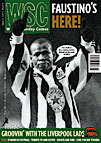 Mick Slatter looks back at one of Liberia's greatest ever role models
Mick Slatter looks back at one of Liberia's greatest ever role models
George Oppong Weah is a disarmingly nice guy. He may have bagged the hat-trick of African, European and World Footballer of The Year, yet remains humble. He still has a common touch, passes on much of his sizable earnings and still allows journalists to get closer to him than most Serie A sweepers.
Football has bought Weah many things. And, aside from the predictable consumables of wealth, fame and prestige, many would say the most valuable prize was the chance to leave his West African home, Liberia. Certainly a one-way ticket to Europe, sports cars, penthouses and football would top most shopping lists in the capital Monrovia, nudging even the desire for an AK 47 into second place.
For Liberia is not so much third-world as pure basketcase. It’s a country ravaged by an alphabet soup of rival warring factions. It’s a country of schizophrenic and megalomaniac warlords. It’s a country where children as young as eight carry and use automatic weapons. It’s a country to leave.
But Weah is nothing if not a patriot. Not only does he make frequent trips home, he has also famously dipped into his own pocket to help the nation, not least by bailing out the national side, the Lone Stars. Football rarely flourishes in civil war. Priorities tend to change, and the Lone Stars were no exception.
When Weah first took out his cheque book they were in tatters with debts owed everywhere and success about as likely as a collective Nobel peace prize. Weah changed all that, paying for almost everything; shirts, boots, hotel bills, flights, match expenses. Of course one can’t help thinking that all this generosity was driven by more than a little self-interest. How else, without changing nationality, could the World’s Best Player get to play international footie?
Weah is clearly keen to play at the top level. Sponsoring the Lone Stars has cost him a small fortune (only possible when you have a large fortune) and while he tries hard to be modest about it all, like someone who’s bought an expensive present, Weah can’t help hinting at how generous he’s been. “It’s cost a lot of money, but when you do things for people you don’t disclose the amount you pay, as you’re doing it for pleasure. I think we should keep the amount to ourselves as it’s private . . . but it’s a lot, thousands and thousands of dollars . . . If I was a very selfish man I would be a millionaire, or even a billionaire, by now.”
He also believes that some of the team are taking a ride at his expense. “When it comes to the playing part, collectively we all give something to the team, the young boys and the professionals; it’s just when it comes to sponsorship that they abandon the team.”
One thing Weah’s money cannot do is buy success for the Lone Stars. Qualifying for the African Nations Cup Finals is probably as good as it will get for Liberia, even with the World’s Best Player in the side. World Cups, and even Nations Cup success, will ultimately need peace more than a willing credit card. But with broken treaties as numerous as breached Italian defences, and a fresh outbreak of bloody fighting, even the latest and most promising round of hearty handshakes to date promise little in the way of peace.
Given all that, it’s tempting, if not rather perverse. to ask Weah if he wishes he had been born somewhere else in Africa, where footballing success might have been easier, like Ghana or Nigeria? “That’s a difficult question,” says Weah, “but I think we should always appreciate where we are born.”
Weah’s loyalty to his home nation has earned him Messianic status in Liberia. Warlords may rant on the radio and demand loyalty through the barrel of a gun, but in this football-obsessed nation, they don’t come close to George. “Weah is like a flame for us,” says journalist Kenneth Jackson. “As long as it burns we can forget the suffering and the pain, we can dream of freedom.”
And when he does return home his welcome is passionate, perhaps even claustrophobic, Certainly when in Liberia his time is not his own, he has been effectively nationalised, made public property. Everyone demands a word, a joke, a handshake. When he failed to show up at a local football match in Monrovia on Christmas Day in which he had been billed as making a guest appearance, disappointed supporters caused a near riot.
But his popularity is due to more than his fiscal freebies. George is a sign of hope. Liberia can advance, can do better, runs the thinking, just look at George. He is even being touted as a future resident of State House. Although real politik suggests that strikers, however impressive, don’t naturally make good presidents, Weah is not an ordinary number nine. And compared to the rather scary alternatives, most of whom should be serving time in various types of institution, he looks an attractive option. Liberia’s fortunes, in many optimistic eyes, could still be rescued if George Weah were to take to the political field.
Certainly Weah’s magnetism has not been lost on the country’s political talent scouts, who would sell their soul if they hadn’t sold it already, for the chance of signing up Weah to their particular factional cause. But Weah is not a factionalist. He is a Liberian, a talisman for thousands of people, and perhaps the only purely national symbol the country still has.
From WSC 109 March 1996. What was happening this month